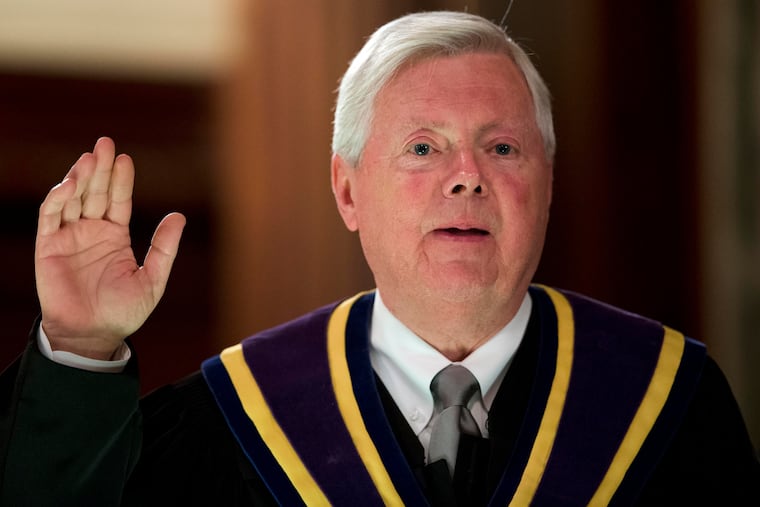Pennsylvania’s chief Supreme Court justice faces an ethics inquiry over an alleged racial insult
Pennsylvania’s judicial ethics panel is investigating whether Chief Justice Thomas G. Saylor pressured a grand jury presiding judge and made a racial comment against a former colleague.

Pennsylvania’s Judicial Conduct Board is investigating whether Chief Justice Thomas G. Saylor improperly pressured a judge presiding over a confidential grand jury investigation, and in the process took a racial swipe at a former Black colleague on the state Supreme Court.
Saylor, through a court spokesperson, confirmed Wednesday that he had received an “informal letter of inquiry” from the board. Normally, such inquiries are kept secret except in the rare cases in which formal charges are brought.
The board is investigating allegations in an affidavit from a former county judge who said Saylor complained to him in 2012 that Supreme Court Justice Cynthia Baldwin had pursued a “minority agenda” when she was on the high court several years before. Baldwin is Black. At the time, Saylor also was an associate justice; he became chief justice in 2015.
The county judge, Barry Feudale of Northumberland County, was then overseeing a grand jury investigation into sexual abuse at Pennsylvania State University by former assistant football coach Jerry Sandusky. Baldwin was then the top lawyer for Penn State, a position that made her a participant in the grand jury inquiry. According to Feudale, Saylor told him that Baldwin would face a disciplinary case over how she had represented the university and told him to cooperate in that case.
Last month, Saylor admitted to talking to the judge about the grand jury, but said the conversation was “entirely appropriate.” Through a spokesperson, he denied saying anything of a racial nature, calling that suggestion “false and offensive.”
He spoke after Baldwin made public Feudale’s sworn affidavit. She did so one day after the state Supreme Court’s disciplinary panel for lawyers officially reprimanded her for legal errors involving the sex-abuse grand jury. The reprimand was ordered by the Supreme Court, but Saylor did not participate in the vote after Baldwin privately confronted him with Feudale’s allegations.
In an interview with The Inquirer last month, former Chief Justice Ronald D. Castille, Saylor’s predecessor, said only the chief justice, not any of the six others on the court (which Saylor was at the time), should talk with grand jury judges. Academic experts also questioned Saylor’s conduct, with one saying it “smacks of an abuse of power.”
Saylor, 73, must step down from the court at age 75, at the end of next year, under the state constitution.
The inquiry into Saylor was first reported Wednesday by the Legal Intelligencer. After the investigation into the justice’s behavior is complete, its findings will be ruled on by the Judicial Conduct Board, made up of 12 judges, lawyers, and laypeople. It can dismiss the matter or resolve it with a private or public “letter of counsel” to the judge. Perhaps four or five times a year, it sends more serious cases to the eight-member Court of Judicial Discipline, which can impose more serious sanctions, including removal from the bench.
While verdicts by that court may normally be appealed to the state Supreme Court, the state constitution calls for a special tribunal to hear cases involving defendants who sit on the high court. Judges of the lower Superior and Commonwealth appeals courts would sit in judgment, according to Richard Long, chief counsel for the conduct board.
In an interview later Wednesday, Baldwin said she had not filed any complaint with the judicial panel to trigger the inquiry, but was glad it was underway. “Everybody is supposed to be under the same law,” she said. “So I think it’s the right thing.”